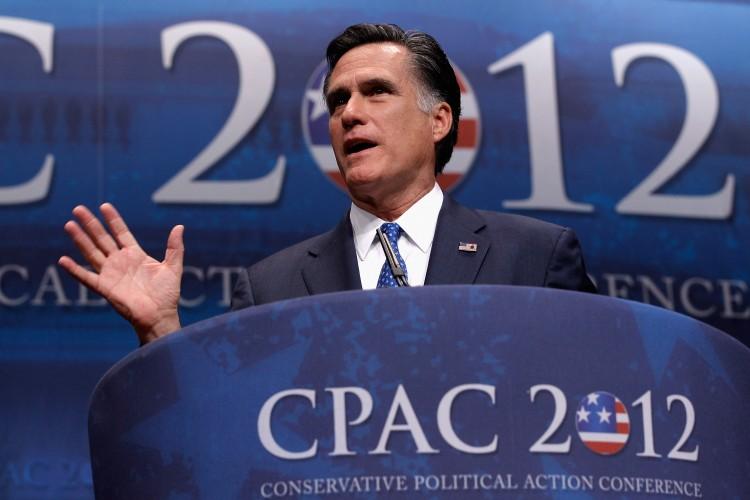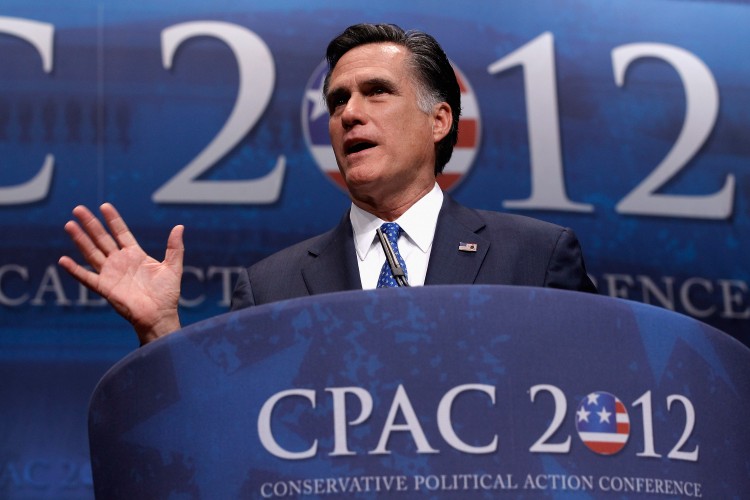Mitt Romney has won the Maine caucuses and a conservative straw poll, but with his three GOP rivals vowing to press on in the campaign and some within Republican ranks declaring a longer race preferable, Romney looks no closer to winning the Republican presidential nomination.
The former Massachusetts governor won the week-long Maine caucus and beat Rick Santorum in a conservative straw poll at the Conservative Political Action Conference (CPAC) in Washington last weekend, but the 2008 Republican vice presidential nominee, Sarah Palin, a staunch Tea Party supporter, told the CPAC audience they did not have to decide yet who their nominee will be.
“I believe the competition has got to keep going,” Palin said shortly after the poll results were announced.
With just over 5,000 caucus-goers voting, Romney beat Texas Rep. Ron Paul with 39 percent of the vote to Paul’s 36 percent.
Pennsylvania Sen. Rick Santorum and former House Speaker Newt Gingrich did not campaign in Maine but drew 18 percent and 6 percent of the vote, respectively.
Romney thanked Maine voters on the night saying: “I’m committed to turning around America and am heartened to have the support of so many.”
While candidates stand to win 24 delegates in Maine, the win was more symbolic, with the poll nonbinding and the distribution of delegates undecided until the State convention in May.
Libertarian Ron Paul had campaigned strongly in Maine, looking for his first win in the GOP contest. He said he was disappointed he had not won outright, noting that Romney had won by only 200 votes.
“You know, we were a little bit disappointed last night,” he told CBS’s Face the Nation. “We did very well up there. But we’re going to continue to do what we do and do the very best and keep accumulating delegates.”
When asked whether he thought he could win the nomination or was really focusing on the national convention in Tampa in August, Paul avoided answering either way.
“Sure, I think both,” he said. “We’re there to win, do our best. Romney has been up and down. The others have been up and down. I haven’t been down. I keep going up.”
Ron Paul bypassed CPAC to focus on Maine, although he won the straw poll last year, but not Mitt Romney—nor the other two candidates.
Romney attended, winning the CPAC online presidential poll of 3,408 conference-goers, with 38 percent of the vote ahead of Rick Santorum’s 31 percent.
Newt Gingrich and Ron Paul trailed behind, gaining 15 percent and 12 percent, respectively.
Struggling to unite Republican voters behind him, Romney honed in on conservative appeal in his CPAC speech, repeating the words “conservative” or “conservatism” throughout the speech, and at one stage describing himself as a “a severely conservative governor of Massachusetts.”
The statement jarred, drawing criticism from other Republicans.
Conservative stalwart, Richard Viguerie, chairman of online conservative news source ConservativeHQ.com, derided the description, issuing a statement describing Romney as a conservative fraud.
“In my 50 years in conservative politics at the national level, I have never heard anyone other than Gov. Romney describe himself as ’severely' conservative,” Viguerie says in a statement.
“Romney has shown, once again, that he can mouth the words conservatives use, but he has no gut-level emotional connection with the conservative movement and its ideas and policies,” he said.
Political analysts Mark Shields and David Brooks, speaking on PBS NewsHour, said Romney’s apparent lack of conviction on important conservative issues was a “core problem” for the candidate, particularly when faced with the challenges of a president.
The jury was still out on whether Romney had the “inner steel” for such an important role, said Brooks.
Shields said people did not know what Romney stood for, noting that his campaign strategy of attacking rivals through massive negative advertising could become a liability.
“He’s got to make the case on why he wants to be president, not why his opponents shouldn’t be,” Shields said.
Invigorated Santorum
Last week Romney accused GOP rivals Newt Gingrich and Rick Santorum of being “Republicans who acted like Democrats.”
Following his three-state win in Minnesota, Missouri, and Colorado last week, an invigorated Santorum fired back, accusing Romney of becoming increasingly “desperate.”
Santorum is presently leading Newt Gingrich by 4 points according to a RealClearPolitic average of five national polls, 24.2 percent to Gingrich’s 20.6 percent, but remains behind Romney who stands at 30.6 percent in the same polls.
Romney also leads in delegation counting, gaining 105 delegates to Santorum’s 71, according to CNN estimates.
Playing to concerns about Romney’s sincerity, Santorum demeaned Romney’s lead, attributing it to strong financial backing rather than policies or public appeal.
“He’s been able to win in these early primary states by, you know, beating the tar out of his opponents by four- and five-to-one on television,” Santorum said. “Well, of course, in the fall, he’s not going to have the most money.”
Palin Wants Longer GOP Race
Former Alaska Gov. Sarah Palin told Fox News in January that a lengthy GOP was desirable “because iron sharpens iron, steel sharpens steel,” she added.
She reiterated that view at the CPAC saying: “We’re hearing now, we’ve all heard from these experts—‘We’ve got to name our nominee right now, wrap it up, no debate for you.’
“As if competition weakens our nominee. in America,” she said, “we believe that competition strengthens us.”
Although she had earlier endorsed Newt Gingrich in South Carolina, Palin had been specific that her support was just for that state.
At the CPAC she refused to offer an endorsement to any of the candidates saying that whoever wins, “for the sake of our party we must stand united.”






